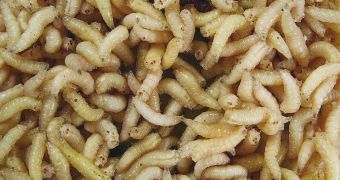As pointed out on several occasions, growing cattle, pigs and other farm animals in order to meet the increasing global demand for meat places considerable strain on the environment.
More precisely, green groups have warned time and time again that whatever crops get sent to animal farms could instead be used to feed humans, and that the meat industry takes its toll on whatever natural resources we have at our disposal.
While some greenheads are encouraging people to either start eating insects or quit meat altogether, the European Union is now determined to find out whether or not this particular branch of the food industry could be made more eco-friendly by feeding farm animals maggots.
The fly maggots now hoped to be a viable alternative to the soya beans usually used to feed animals are said to be highly rich in proteins, Daily Mail reports.
In order to obtain them, the European would only have to make it possible for flies to breed on an industrial scale.
Specialists say that providing these insects with access to animal and vegetable waste would be more than enough to put them into a breeding frenzy.
They also maintain that, since flies are not in the least picky, so-called fly farms could use whatever waste resources are widely available in their area.
“What's used will depend on the area. In Scotland, if there are 10 whiskey distilleries nearby it will use the grain fermented in the distillation process,” stated specialist Georg Melzer on behalf of a company currently involved in this project.
Presently, the legislation in the European Union forbids the sale of meat products made from animals whose diet included maggots.
However, should ongoing trials in Belgium prove successful, it is likely that high officials will agree to roll out new laws and give the green light to the practice of using fly maggots to keep animal farms up and running.

 14 DAY TRIAL //
14 DAY TRIAL //